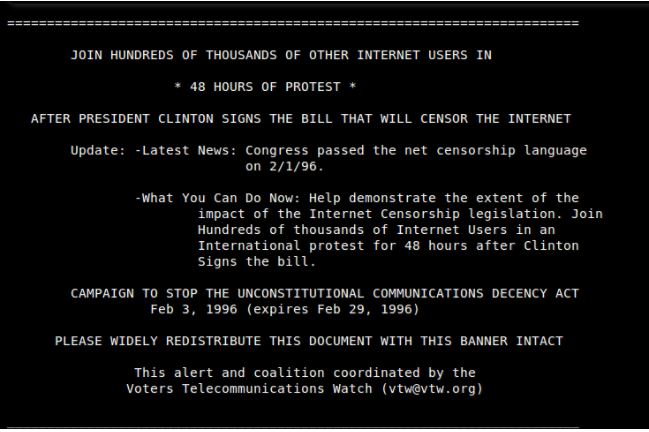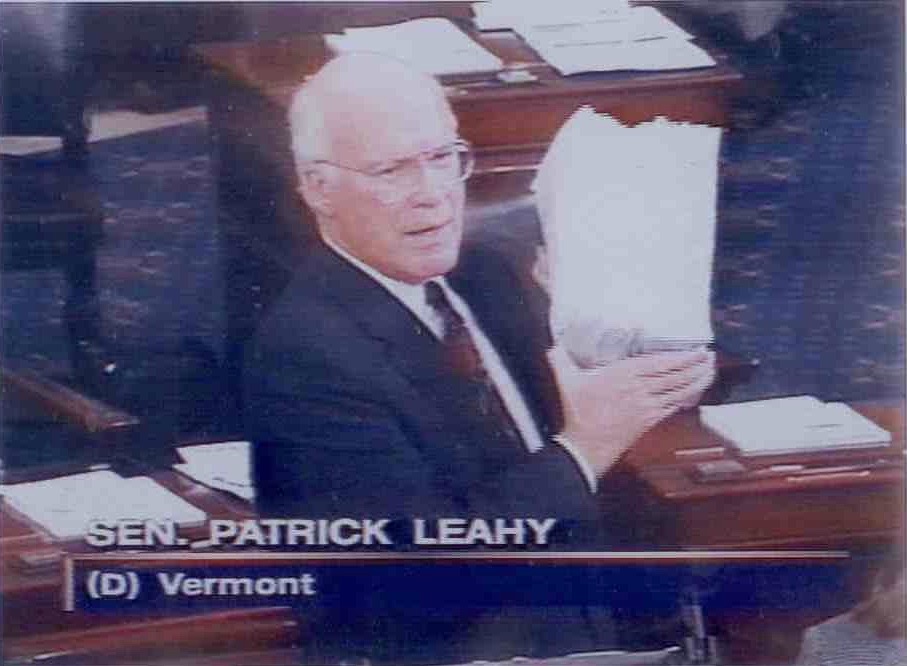Today marks the 25th anniversary of the 1996 “Black Page Protest” when thousands of websites went dark for 48 hours to protest the Communications Decency Act. It was a moment that defined the future of digital advocacy and the internet as we know it. <thread>
I was in the room where it happened, and helped organize and lead the effort. This thread reflects on some of that history...
On Feb 8, 1996 Pres Clinton signed the Telecomm act of 1996. @CenDemTech which I helped to found in 1994 with Jerry Berman, @djweitzner, @DMulliganUCB, and Janlori Goldman, played a major role in the legislation, including what later became #Section230
The CDA was a well-intentioned but misguided attempt to protect kids from inappropriate content on the nascent web. While drafting the Telecomm Act in 1995, the Senate had approved the CDA, sponsored by Jim Exon (D-NE), imposing broadcast-style content regulations.
Under the CDA it would have been a crime punishable by a fine up to $250,000 and 5 yrs in jail for posting “indecent” content online. CDT built a coalition of advocacy groups, and tech companies to argue that there were more effective and less restrictive ways to protect kids
During this time CDT along with allies VTW and EFF led some of the first online campaigns: the first online petition with over 100,000 signatures (which Sen. Leahy carried to the floor in 1995), and a massive email campaign that generated tens of thousands of letters and calls
Our advocacy fell short in the Senate. We were no match for Sen. Exon’s “Blue Binder of Porn”. But we found a more receptive audience in the House.
Reps. Ron Wyden (D-OR) and Chris Cox (R-CA) understood that the internet was a completely different medium than TV and Radio, and that any effort to regulate content required a medium-specific approach.
Wyden and Cox pushed for user empowerment: incentives for content filtering and user controls so parents not the government could decide what was appropriate for their families and liability protections for platforms to encourage their use. And so was born #Section230
When the House approved its version of the Telecomm Act it rejected the Exon CDA and instead included the Wyden/Cox approach. The bill then went to a joint House/Senate conference committee in late 1995.
While CDT and others fought to remove the CDA, the conference committee settled on a mash-up, including both the CDA and Wyden/Cox in the final bill. Also included was a fast-track provision to allow expedited judicial review of the CDA. The Telecom Act was passed on Feb 1, 1996
CDT and our coalition allies knew #Section230 was a historic win that had the potential to unleash the internet economy. But the CDA “indecency” standard was a major problem. Broadcast-style regulations would have been a nightmare - stifling speech, creativity, and investment.
And we had also lost the narrative. The CDA’s supporters had succeeded in framing the debate to their advantage – that the Internet was full of porn and was a danger to kids, and heavy-handed content regulation was the only solution.
As we prepared to challenge the CDA in court, it was vital to reframe the discussion back to free speech vs. censorship, and to highlight the negative impact the CDA would have on the development of the web. We knew we needed to bring the public around to our side.
And so was born the idea of the “Black Page Protest”. Netscape had just released a version of their browser that supported background colors in HTML. We had assembled a coalition that included most of the commercial web and tens of thousands of individual websites
We put out a call to action: For 48 hours beginning at 12 noon Feb 8, 1996 as President Clinton signed the Telecom Act, publishers changed their background color to black and added a link to our action center with the line “Why is this page black?”

 Read on Twitter
Read on Twitter



